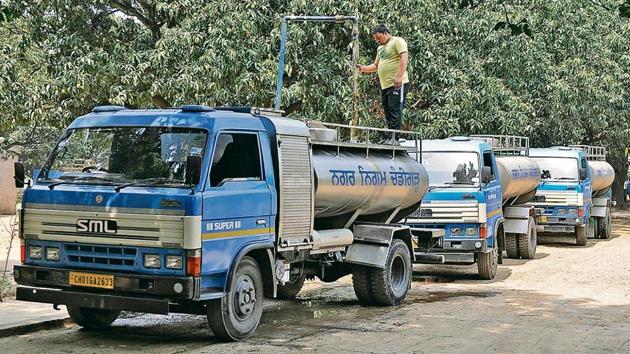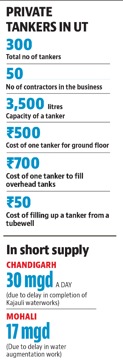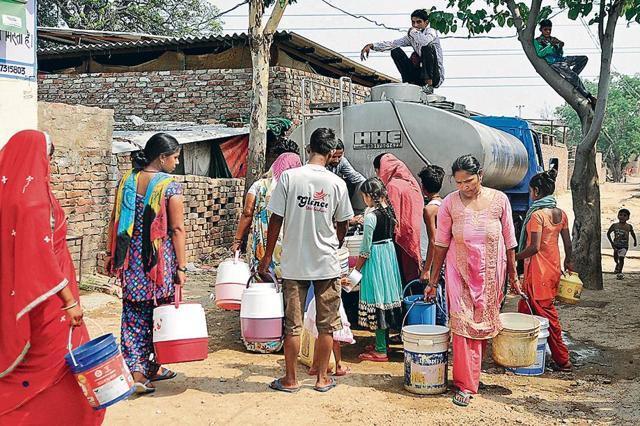HT Spotlight: Booming business of water in Chandigarh
Every drop counts: Water tankers in the tricity do a business worth crores in the summer months as the demand for H2O outstrips the supply.
With many parts of Chandigarh and Mohali reeling under water shortage, the business of water is booming. Chandigarh is short of 30 million gallons of water a day (MGD) during the summers. On any given day, the municipal corporation receives at least 300 water-related complaints. This shortfall is made up by around 300 private tankers and 13 tankers of the Municipal Corporation that make three to four trips a day.

Tankers charging anywhere between Rs 500 and Rs 700 for a few thousand litres are a daily fixture, especially in some parts of Zirakpur where the piped water is of poor quality.
Balpreet Singh, who set up Malwa Tankers in 1992, says the business received a big push in 2010 when the demand for water started outstripping the supply.

The price of water
While MC charges Rs 350 per tanker for supplying water for events through its fleet of 13 tankers, private tankers demand Rs 500 to provide water to the ground floor, and Rs 700 to pump it to the upper floors. The 313 tankers in the city are already making at least four trips a day. With a standard tanker carrying 3,500 litres of water, this translates into a humongous 43.82 lakh litres for around Rs 7 lakh a day, and over Rs 2 crore a month.
This sum doesn’t take into account the gallons of drinking water that residents buy from the market or the bottled water supplied to the thousands of establishments across the city.
Most of the restaurants in the city also get their overhead tanks filled from private tankers every day.
In Chandigarh, it’s the densely populated southern sectors with multi-storey apartments that are hit the hardest. Sectors like 15, 22, 31 to 35, 44 to 51 also suffer from low water pressure, which forces residents staying on upper floors to employ tankers.
Harish Saini, executive engineer of public health, says the 13 MC tankers are available round the clock to supply water during this season of shortage. Seeing the huge demand, the MC is planning to get electric motors fitted in all of them so that the overhead tanks can be filled directly, he said.
Source of water
An MC official said they get their water from deep bore tube wells at a depth of 300 metres and then chlorinate it. Private tankers, he claimed, often fill their tankers from tube wells at a depth of around 80 metres, and the water they supply is not safe for drinking.
The MC tankers, he claimed, are made of food-grade stainless steel, while private tankers are of mild steel.
Balkar Singh, who owns several private tankers, says he gets them filled from tube wells in some villages of Mohali at a cost of Rs 50 per tanker. Singh says he doesn’t chlorinate the water as people usually use tankers for filling up their overhead reservoirs. “They drink the water only after purifying it,” he said.
Unlike Mohali and UT, private operators in Panchkula have to get their water passed by the Public Health Department before supplying it.
400 tankers in Mohali
Mohali, which faces a shortfall of almost 17 MGD every summer, too has a 400-strong fleet of private water tankers. A public health official said many of these tankers are used by builders on construction sites.
Parmeet Singh, a resident of Sector 63, said water scarcity is a common problem in the city. “The water supply gets hit whenever there is a power outage. We are left with no option but to call the tankers.”
Mohali MC Commissioner Sandeep Hans, however, claimed the shortage is not that severe this summer. “We are able to supply water to every part of the town,” he said, adding that he had not received any complaints about private tankers overcharging.

No shortage in Panchkula
In Panchkula, Haryana Urban Development Authority (HUDA) executive engineer NK Payal said there is no water shortage in the town. The Panchkula MC has just one water tanker, which is used only for official purposes. “It could be during a VIP visit, official function, or during protests,” he said.
HUDA officials claimed that Panchkula is the only city in the region where supply outstrips demand. “The peak demand in the city is 67.45 cusecs, while our water supply to Panchkula is about 76 cusecs from 193 tubewells, Bhakra and Kaushalya dam. We have dug up more tube wells to make up for any shortfall in water,’’ said a senior official.
There are more than 50 private water tankers in the city, which are pressed into service only during events and celebrations. Mahender Singh, who’s been running Saini water tankers for the past 25 years, says the price of a tanker carrying both potable and non-potable water varies according to the requirement and occasion.
“Tankers are used in marriages, functions or by commercial establishments such as hotels, showrooms and gyms, which don’t get adequate water on their top floors,” said Singh, who claimed he does a business of Rs 2,500 to Rs 2,700 a day.
(with inputs by Saurabh Chauhan and Yuvraj Kaushal)




